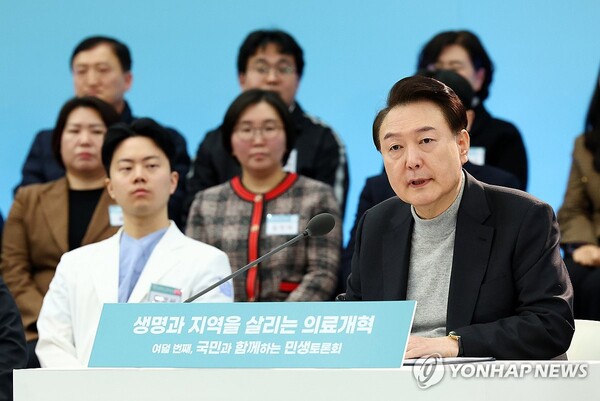President Yoon Suk Yeol said Thursday he will support the expansion of medical personnel to address the shortage of health care providers in remote areas and essential medicine, doubling down on a plan fiercely opposed by doctors' groups.
Yoon, however, also promised to reduce the legal risks caused by medical accidents and to introduce a new scheme to fairly compensate doctors for their work.

"The elderly population is increasing rapidly and demand for the health industry is also increasing greatly," he said during a government-public debate on medical reform issues at Seoul National University Bundang Hospital in Seongnam, just south of Seoul. "In order to revive local medical services and essential medical services, expanding medical personnel is essential."
"We will support the expansion of medical personnel by creating the conditions for quality medical education and training," he added.
The government has reportedly been looking to raise the annual enrollment quota at medical schools by at least 1,000 from the current 3,058, starting in 2025. The move comes amid a shortage of doctors in non-metropolitan and remote areas, as well as in the essential medicine field, including pediatrics and emergency care.
Doctors have protested the plan, saying the government should instead explore ways to better allocate physicians and boost their compensation.
"Now is the golden time to pursue medical reform," Yoon said, noting plans to invest more than 10 trillion won (US$7.5 billion) in surplus health insurance premiums in the essential medical services sector. "If we retreat from the medical reform that the majority of people wish for due to the objections and resistance of some, that would be no different from neglecting the fundamental role of the state."
Yoon offered to address the concerns of doctors by completely overhauling the response to medical accidents, citing repeated cases of doctors undergoing what are often futile police investigations and victims receiving less than the compensation they deserve.
"I will create a system so that doctors can treat according to their own convictions and victims can receive generous compensation," he said.
Yoon also vowed to draw up a new scheme to justly reward doctors for their work, especially those in high-risk departments or on constant standby.
According to the health ministry, the number of doctors per 1,000 people in South Korea came to 5.6, far below the average of Organization for Economic Cooperation and Development member nations.
Speaking at the debate, Health Minister Cho Kyoo-hong outlined the details of a new policy package consisting of four core lines of effort -- increasing medical personnel, strengthening local medical services, building a safety net for medical accidents and enhancing compensation fairness.
He also announced plans to establish a special presidential committee on medical reform.
The debate was the eighth in a series on people's livelihood issues and was attended by some 60 members of the public, including patients, guardians, hospital chiefs, doctors and nurses, as well as relevant government officials.

